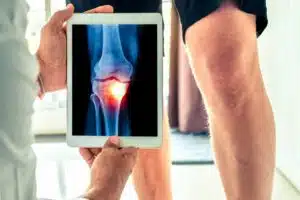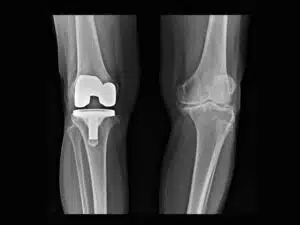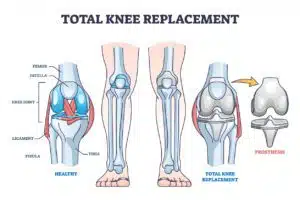Knee pain can make everyday activities like climbing stairs or standing up really hard. If the pain sticks around and gets worse, it could mean there is a bigger issue. For some people, knee replacement surgery might be the best way to reduce pain and get moving again. If you are unsure about whether it…
Knee Replacement
Pain-Free Life After Knee Surgery
Undergoing knee replacement surgery is a significant step toward reclaiming a pain-free and active life. But it is only the first step. Having a pain-free life after knee surgery involves more than just surgery. Achieving and maintaining your knee requires diligent post-operative care. This article will explain how to ensure a smooth and pain-free recovery…
Reviving Joints, Restoring Lives: The Impact of Replacement Surgery
A joint replacement is a procedure an orthopedic surgeon can perform to improve how you live. Joint conditions such as arthritis cause pain and limited mobility. Wherever it may develop, whether on the shoulder, hip, knee, or ankle, it can lower the quality of your life. After the surgery, patients get a new joint, which…
How to Care for Your Incision After Knee Replacement Surgery
When you have knee replacement surgery, taking care of your incision is very important. Proper care helps the wound heal well and prevents infections. It is not just a small task but a crucial part of your recovery. Understanding how to look after your incision can help ensure a smooth and speedy recovery. This guide…
Knee Replacement: A Guide to Finding the Right Fit
If you have received a diagnosis of advanced osteoarthritis of the knee joint and are experiencing debilitating knee pain, stiffness, and swelling, it is advisable to consider knee replacement as a permanent solution to your knee pain. Knee replacement, as its name implies,is a surgical procedure in which your malfunctioned knee joint or its components…
Knee Replacement: A Step-by-Step Guide
A knee replacement surgery is one of the most commonly performed replacement procedures in the United States. Knee replacement is when your worn or damaged knee joint – partial or complete – is surgically removed and replaced with an artificial knee joint. Knee replacement is highly effective at relieving knee pain and improving mobility. It…
The Benefits of Knee Surgery-What You Need to Know
Knee problems, like pain, swelling, and reduced mobility, can interfere with your daily activities, and if not treated and managed on time, these lead to severe consequences. Minor knee problems respond well to nonsurgical treatments. But, surgery is recommended when all nonsurgical treatment options fail to treat and eliminate the symptoms of knee problems. Gradual…
Questions to Ask Your Doctor Before Knee Replacement
Knee replacement surgery – a surgical process in which your damaged knee joint is removed and replaced with a man made knee joint – is a major surgery that requires careful consideration. Asking questions from your knee replacement surgeon before surgery is important as it allows you to understand the benefits, risks, and alternatives to…
What is a Knee Arthroscopy?
Gone are the days when you had to undergo a knife to have your orthopedic doctor pinpoint the underlying cause of your joint problem and/or treat it. Thanks to advances in orthopedic surgery, orthopedic surgeons can now makeone or two small incisions and use a device calledan arthroscopeto diagnosea wide range of joint problems and…
Can You Have a Knee Replacement With a Torn ACL
A knee replacement is a procedure to replace a damaged knee joint. There are many factors doctors consider before making a recommendation for a knee replacement. First, you have to be generally healthy, independent, and mobile. For instance, some people with diabetes may not be good candidates for this type of surgery because they can…











